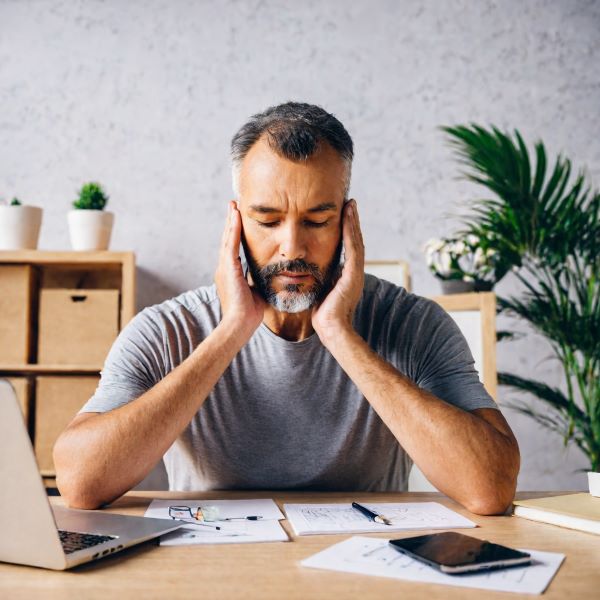Introduction
Stress is just everywhere these days it’s easy to forget how much it affects us until we’re totally overwhelmed. Between work stuff and personal life the nonstop rush of everyday life makes me feel drained scattered. I once thought feeling stressed meant you were busy or doing well but now I get it unchecked stress really hits everything about how I am—from my clear thinking to staying healthy.
It’s taken time maybe some trying things out and thinking about myself to find what works. Here I want to share some ways I manage stress that really help me stay calm focused. It doesn’t matter if you have deadlines family stuff or just life being unpredictable these practices can steady your mind boost your well-being. It’s not about getting rid of stress completely (let’s be honest—that’s just not real life), but learning how to face it clearly strong and knowing yourself.
Table of Contents
Understanding Your Stress Triggers
Amongst the first moves I made in handling stress better was figuring out what actually sets it off. Initially I assumed stress simply “arrived” when life became busy. Yet by slowing down and paying attention, I began noticing patterns – specific situations, people or even thoughts that consistently caused me to feel anxious or tense. I started journaling about everyday happenings and emotional responses; over time, this helped me identify recurring themes linked to my stress levels.
This understanding truly gave me greater command over how I reacted. After being able to recognize stress triggers, I could prepare for them or perhaps alter my method entirely. For instance, I understood saying yes to all requests at work meant feeling overwhelmed; I then honed the skill of setting boundaries and prioritizing tasks. Such small shifts made an immense difference in managing daily stress. It was incredibly empowering – realizing I wasn’t powerless; I just needed insight plus readiness to make adjustments.

Deep Breathing and Mindful Meditation
Breathing was never something special to me– just natural maybe even a bit boring. Yet there was something different about it after really practicing deep breaths and mindfulness meditation, I started feeling way calmer, especially when things got intense. It was like this little trick: take a few minutes focus on your breath and suddenly you feel rooted right where you are; it cuts down those swirling worries too. My heart rate drops, muscles relax and there’s just this nice gap between feeling something and acting on it.
Even just five or ten minutes daily– mindful meditation has really helped change how I think. Find a quite spot sit close your eyes pay attention to your breath maybe a soothing phrase. Instead of jumping right into emotions I’ve learned to watch thoughts from afar so to speak. It takes practice sure like getting good at anything takes time but it’s been a super helpful tool for dealing with stress bringing some peace into the day. I’ve also tried out guided meditations and mindfulness apps they give you a framework plus a bit of help for those more difficult days.
Prioritizing Sleep and Rest
It’s a reality I’ve come to face. When sleep eludes me, stress levels shoot right up. In the past, sleep was something I’d cut back on hoping to finish more tasks, but oh, has that lesson been learned the hard way? This approach just fails miserably. Sleep isn’t something extra or optional—it’s deeply necessary now understood as essential for function: when prioritizing rest focus increases productivity improves and emotional evenness returns.
Establishing a calming pre-sleep routine has been key for me in unwinding each evening. Whether through reading taking a warm bath or just switching off screens an hour beforehand these actions tell my body it is time to slow down now: I’ve also worked on improving where I sleep getting better pillows and ensuring the room is quiet and dark too. Getting sufficient rest truly makes a significant difference in managing stress the following day; waking up feeling rested, I am stronger and more able to cope with challenges presented by whatever arises.

Physical Movement and Exercise
Getting active has been a top stress-reliever for me for ages. It really doesn’t have to be intense, I find even a short walk helps clear my head and lifts my mood. Physical movement is great for releasing tension and getting those good endorphins going which make stress feel easier to handle. When I miss out on moving for too long, I notice I get restless and tired and that just adds to feeling anxious.
On days when everything feels too much I remind myself getting my body moving isn’t just about fitness it’s about clearing my mind. Whether it’s yoga dancing in my living room or jumping on my bike finding ways to move helps me connect with my body again and feel more in charge. I also like group classes sometimes when I need a social lift or just want people around who care about wellness like I do. Movement has become one of my most dependable ways to stay balanced.
Managing Time and Setting Boundaries
Getting good at time management really turned things around for me. I was the kind of person who always said yes to everything, filled up my schedule completely. But figuring out how to put things first and say no sometimes, that’s been a truly empowering way to manage stress. It showed me that my time actually has value, and that saying no isn’t rejecting someone—it’s more like taking care of myself. I began looking closely at my daily activities, wondering if they really matched up with my goals and how I wanted to feel.
I got into using planners and time-blocking, it gave my day some structure. Knowing what tasks were ahead—and when—really cleared up that mental tangle that causes stress. Plus I finally let myself rest okay without feeling bad which actually made the time I worked much more focused and useful. Having boundaries also meant keeping my energy safe from draining conversations or difficult environments. It isn’t always simple but it’s been so essential in building a life that feels like it will last.
Staying Connected and Asking for Support
One really tough thing I figured out is I don’t have to handle everything by myself. Before I used to keep stress inside and try to just push through it solo. But I’ve come to understand that chatting with a good friend or reaching out for help can be incredibly healing. When I share how I feel with someone who listens without judging it takes a real weight off my shoulders and reminds me I’m not the only one struggling.
Keeping in touch with folks who genuinely care—whether that’s friends family or maybe a therapist—reminds me I’m not alone in tough times. These connections bring you emotional support fresh perspectives and often just that comfort knowing someone is there for you. Sharing what’s going on helps make the emotional weight lighter and often gives me new angles or solutions I hadn’t thought about first. Vulnerability used to seem kind of scary but now I see it more as a sign of strength and like a path to deeper more meaningful relationships.

Practicing Gratitude and Positive Thinking
In those moments of stress, the tendency is there to fixate on the things that are not going right. Nevertheless, I have come to realize that altering my focus toward what is indeed going well truly makes a notable difference. This can be accomplished by keeping some sort of gratitude journal–where you list a few items for which you are thankful daily; this aids in reframing your experiences and promoting a more positive perspective. Such an activity reminds me that no matter how trying circumstances appear, there is perpetually something favorable one can hold onto.
This attitude does not involve ignoring difficulties or feigning that all is perfect – it merely involves achieving a balanced viewpoint. To do this I attempt to commemorate minor victories and recognize progress–even if such accomplishments feel somewhat inconsequential at first glance. Positive thinking has a way of reducing the power of stress plus it reminds me that even in trying periods, there’s still good things present in my life. It is an attitude which has helped me stay grounded as well as hopeful. Through time gratitude has modified the manner by which I see setbacks – transforming them from reasons for despair into chances for personal growth.
Creating a Personal Calm Ritual
And here’s one thing that’s been super helpful: creating my own personal calm ritual, something special I can rely on when everything feels too much. For me that means lighting a candle grabbing a cup of herbal tea and letting calming music fill the air. This ritual tells my body and mind ‘Hey, time to slow down let’s recharge.’ It carves out this lovely moment of stillness, where breathing deep is easy and I get to reconnect with who I am.
You know, everyone’s idea of a calm ritual is totally different. The real key? Finding what soothes *you* and weaving it into your regular life. Maybe journaling is your thing or perhaps it’s sinking into a warm bath or just stepping outside for a breath of fresh air. Having this built-in pause button? It’s really helped me reset on those crazy stressful days. It reminds me I actually hold the power to create my own peace even when the world seems chaotic all around. Over time these rituals feel like a safe haven I can always come back to no matter what life happens to throw my way.

Conclusion
Getting rid of every bit of stress is just not how it works—life’s going to throw stuff at you no matter what. Instead managing stress is really about figuring out healthier ways to handle it, feeling more in control. Things like deep breathing setting boundaries staying connected and looking after my body and mind give me tools to feel centered. I’ve learned being resilient isn’t about dodging problems—it’s knowing I can handle them with my own strength and kindness.
What helps me might not be exactly right for you but the big thing is just starting. Try some techniques see how they make you feel maybe tweak them a bit. This path to feeling calm and focused isn’t about doing everything perfectly—it’s more about moving forward getting to know yourself better. Stick with it give it time and you’ll discover what helps you find balance peace and strength. And maybe the best part is realizing you’re definitely capable of handling life’s curveballs with real grace and a clear head.
FAQs
Q1: Feeling overwhelmed in the moment? What’s the fastest way to calm down?
A1: Deep breathing is a quick method that works wonders for soothing the nervous system – try inhaling for four seconds holding it then exhaling for four; it makes a real difference.
Q2: How can one manage stress when there just isn’t much time available?
A2: Even small gestures such as a short walk, perhaps five minutes of meditation or simply silencing notifications can bring notable stress relief.
Q3: What happens if I use these methods but still end up feeling overwhelmed by everything?
A3: That is perfectly okay some stresses are deeply ingrained and may require more attention. You should not hesitate to seek help from a therapist or counselor for extra support.
Q4: Does managing stress levels truly have an effect on my ability to focus on things?
A4: Absolutely it does – when the mind is peaceful concentrating on tasks making decisions and staying productive becomes easier. Stress tends to cloud mental clarity therefore reducing it allows clearer thinking.


